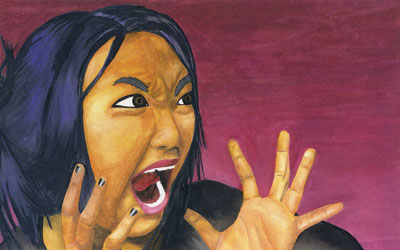All Nonfiction
- Bullying
- Books
- Academic
- Author Interviews
- Celebrity interviews
- College Articles
- College Essays
- Educator of the Year
- Heroes
- Interviews
- Memoir
- Personal Experience
- Sports
- Travel & Culture
All Opinions
- Bullying
- Current Events / Politics
- Discrimination
- Drugs / Alcohol / Smoking
- Entertainment / Celebrities
- Environment
- Love / Relationships
- Movies / Music / TV
- Pop Culture / Trends
- School / College
- Social Issues / Civics
- Spirituality / Religion
- Sports / Hobbies
All Hot Topics
- Bullying
- Community Service
- Environment
- Health
- Letters to the Editor
- Pride & Prejudice
- What Matters
- Back
Summer Guide
- Program Links
- Program Reviews
- Back
College Guide
- College Links
- College Reviews
- College Essays
- College Articles
- Back
Don't Create, Don't Rebel
Throughout the past few decades, punk has emerged from the shadows, as have several subgenres of punk. Each subgenre has an artist thought to have started or lead the “movement” linked to the genre, from Crime and the East Bay, to Minor Threat and straightedge, to Operation Ivy and speedska.
Since its origin in the 1970s, women have consistently been behind the scenes of punk rock. Kamala Parks booked shows for bands and cofounded Gilman, potentially one of the most famous punk clubs of all time. Adrienne Droogas wrote for Maximum RocknRoll, on top of singing for Spitboy. Kriss X was one of many members in an all-female motorcycle club called the Devil Dolls. There were always women in punk, important women who shaped the scene: Penelope Houston, DMR, Insane Jane. Yet, the genre was still a boys’ club. Girls acted as coat hangers while their boyfriends went crazy in the mosh pits. All of the girl punks could confirm that girls have just as much aggression pent up as boys, yet they were never allowed to express it. God forbid a man was arrested for public urination while intoxicated, but when a female punk was assaulted or abused inside or outside of a punk club, no one paid the incident any mind.
In 1990, a new subgenre that brought women to the frontlines of punk was developing in Olympia and Washington D.C. Riot grrrl. Citing influences such as Joan Jett and The Slits, riot grrrl was a new breed. It was not a new breed in the sense that it was angry and loud, although many talented musicians emerged from the genre. It was a new breed because it was composed almost entirely of women who did their own bidding. Riot grrrl encouraged girls as young as twelve to assert their rights of free speech. It encouraged women to speak out to make a change in the world, whether that change was in representation of women in media, or in demanding respect of their various gender identities and sexualities. Zines like Girl Germs and Jigsaw addressed issues with gender roles, the objectification of women, and rape culture.
Kathleen Hanna was named the unofficial leader of self-proclaimed “riot grrrls” everywhere. Forming Bikini Kill with friend Tobi Vail, and Billy Karren and Kathi Wilcox, she advocated that females take back ownership of their bodies and do what they please without the validation of men. As “Double Dare Ya” proclaims, “Dare ya to do what you want/ Dare ya to be who you will.” It was common for Hanna to be asked after performances how fellow riot grrrls could be as open and outright about their views, and she encouraged them to start their own bands and play shows, write zines, and spread word about solutions to common issues among women and girls.
The entire riot grrrl movement inspired girls everywhere, from Washington D.C. to Portland, Oregon. It gave young women ideas by reaching outside of the corporate-backed, manufactured pop music that played incessantly on the radio and showing them that they had control of what they listened to, who they supported. Erin Smith was a fifteen year old record collector before Bratmobile approached her to play with them. April Miller was a chubby teenage girl who eventually wrote Fat Girl, a zine about body positivity, after encouragement at a riot grrrl show she attended in New England.
The direct influence of riot grrrl lasts to this day. Bands such as Potty Mouth, Girlpool, the Coathangers, and TacocaT have similar messages to those promoted in the heyday of riot grrrl, but have developed their own sounds. Skinny Girl Diet’s Delilah Holliday said, “When I was younger, I tried to go to gigs and didn’t feel that welcome as a girl, especially at punk shows, and it just pissed me off. But I didn’t stop going to those shows so the anger built up, and that’s what pushed me to start a band and change things. We try to make our shows really inclusive to girls and write about things that girls can relate to.” The intention of riot grrrl was to provide a place in punk for females that was not at the back of the room, the side of the moshpit. While trying to maintain a feminist outlook of full equality for all genders, not just women, riot grrrl inspires teenage girls to find a niche and write, make music, shout about equality, etc., even when everyone else refuses to acknowledge the issues in the world. As issue two of Bikini Kill Zine states in the “Riot Grrrl Manifesto”, “BECAUSE I believe with my wholeheartmindbody that girls constitute a revolutionary soul force that can, and will change the world for real.”

Similar Articles
JOIN THE DISCUSSION
This article has 0 comments.
